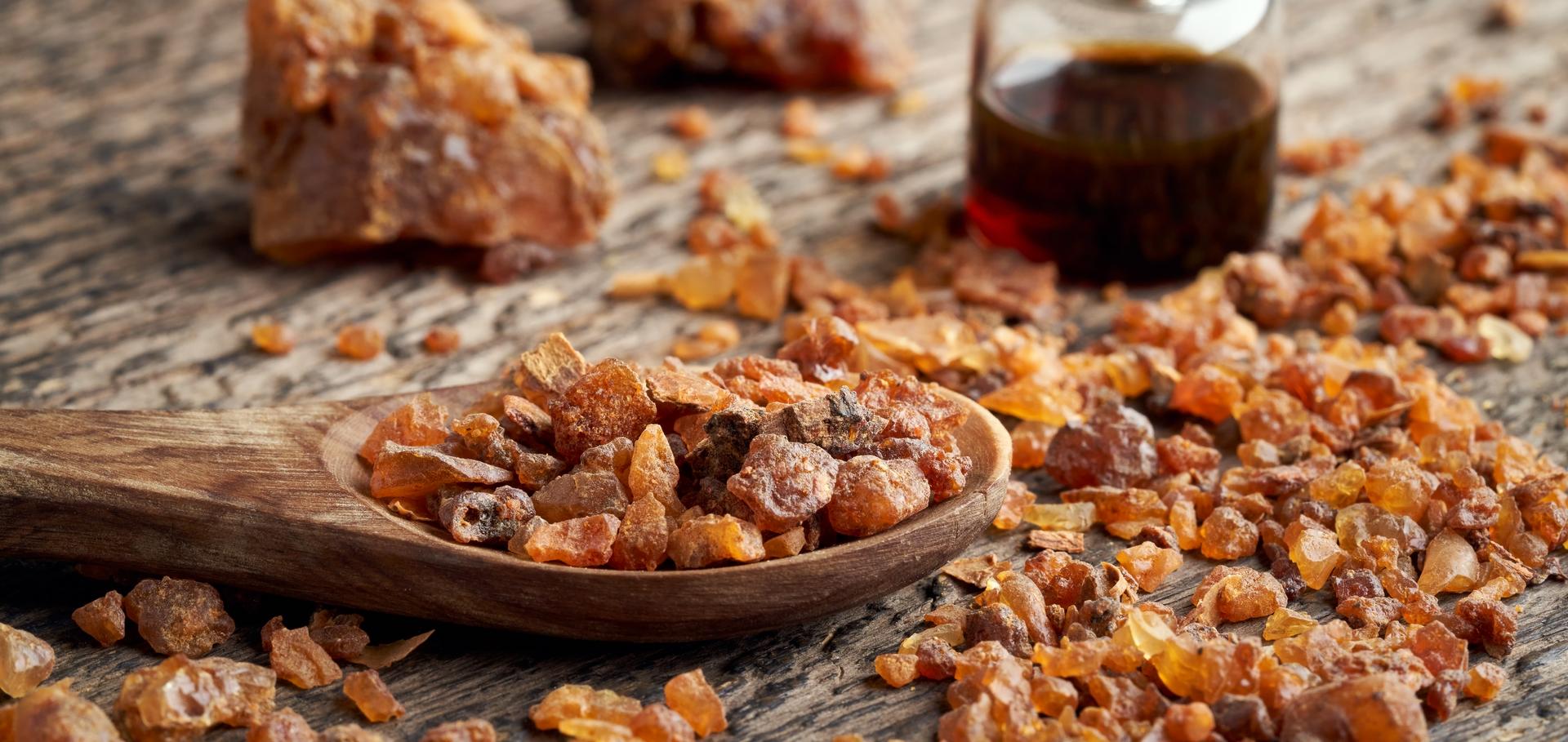What is…
myrrh in the Bible
Two Hebrew words and one Greek word are translated as myrrh in the Bible.
-
Mor and smurna
Hebrew: מֹר —transliteration: mor —meaning: myrrh
Greek: σμύρνα —transliteration: smurna —meaning: myrrh
Myrrh is first mentioned as a principal ingredient in the “holy anointing oil” for God’s Tabernacle (Exodus 30:23).
Myrrh was also part of the gifts brought by the wise men from the east, who came to worship young Jesus.
And after coming into the house they saw the Child with Mary His mother; and they fell to the ground and worshiped Him. Then, opening their treasures, they presented to Him gifts of gold, frankincense, and myrrh. —Matthew 2:11
Myrrh was used in embalming (John 19:39), and also as a pleasant perfume.
All Your garments are fragrant with myrrh and aloes and cassia… —Psalm 45:8 excerpt
I have sprinkled my bed with myrrh, aloes, and cinnamon. —Proverbs 7:17
Now when it reached the turn of each young lady to go in to King Ahasuerus, after the end of her twelve months under the regulations for the women—for the days of their cosmetic treatment were fulfilled as follows: six months with oil of myrrh and six months with spices and the cosmetics for women—then the young lady would go in to the king in this way: anything that she said she desired was given to her to come with her from the harem to the king’s house. —Esther 2:12
Myrrh is a fragrant gum-resin extracted from small, thorny Commiphora myrrha trees of the incense tree family (aka torchwood family, Burseraceae). The trees resemble acacia. When the tree is wounded through the bark and into the sapwood, it secretes resin.
Myrrh resin was used throughout history in medicine, perfumes, and incenses. Myrrh mixed with wine (or wine vinegar and water: posca) was widely used in ancient cultures as an anti-inflammatory and analgesic or to produce pleasurable feelings. It is also anti-bacterial and anti-fungal and so was used in treating wounds and diseases such as leprosy and syphilis. It was also used as an insect repellent.
The “bundle of myrrh” mentioned in the Song of Solmon is a small scent-bag or pouch containing myrrh.
My beloved is to me a pouch of myrrh which lies all night between my breasts. —Song of Songs 1:13
Pain relief
It was a custom of the Jews to give those who were condemned to death by crucifixion “wine mingled with myrrh” to reduce their sensitivity to pain due to its analgesic properties. This drugged wine was probably partaken of by the two malefactors, but when the Roman soldiers pressed it upon Jesus “he received it not” (Mark 15:23). (See GALL.)
-
Lot
Hebrew: לֹט —transliteration: lot —meaning: secret, secrecy, hidden, covertly
This may be another name for myrrh, or perhaps something similar, such as ladanum (a Latin word / Arabic: ladan) that is processed from the aromatic juice of rockrose shrubs (Cistus ladanifer and Cistus creticus). The result is a fragrant, soft, sticky, dark brown resin used in making perfumes. Rockroses are found in the Middle East and lands surrounding the Mediterranean. Like myrrh, in addition to its fragrance, it also has some pain relieving property.
The Hebrew word lot is translated as “myrrh” in Genesis 37:25 KJV; 43:11 KJV. The Revised King James Version marginal note says “or ladanum”. Some translations say “aromatic resin” or simply “resin.” But most say “myrrh.”
…a caravan of Ishmaelites was coming from Gilead, with their camels bearing aromatic gum and balm and myrrh, going to bring them down to Egypt. —Genesis 37:25 LSB
…take some of the best products of the land in your bags, and bring them down to the man as a present, a little balm and a little honey, aromatic gum and myrrh, pistachio nuts and almonds. —Gen. 43:11 LSBexcerpt
More information
- Perfumes and sweet fragrances in the Bible
- What is incense and how was it used in the worship of God?
- Spices—What does the Bible say about them?
- About embalming in the Bible
